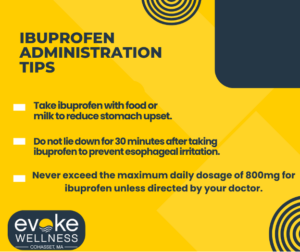As you consider the pain management protocols at your drug rehabilitation clinic, examining the use of ibuprofen as part of a multi-modal analgesic regimen is prudent. With nearly 30 million Americans misusing opioids, leading to over two million with opioid use disorders, the need for effective, evidence-based pain control during detoxification is clear. Research shows that integrating ibuprofen into a around-the-clock pain medication schedule can lead to meaningful reductions in opioid requirements during detox. This allows patients to avoid escalating doses while still maintaining comfort. When administered correctly, ibuprofen is a safe, inexpensive adjunctive therapy during drug rehabilitation. Careful review of protocols to optimize the use of ibuprofen is an important step clinics can take to improve patient outcomes. Call us at (617) 917-3485 today or reach out online.
What Is Ibuprofen and How Does It Work?
A Common Pain Reliever
Ibuprofen is a nonsteroidal anti-inflammatory drug (NSAID) widely used to relieve pain, reduce fever, and reduce inflammation. It is available over-the-counter in low doses and by prescription for higher doses.
Mechanism of Action
Ibuprofen works by blocking the production of prostaglandins – hormone-like substances that cause inflammation, pain, and fever in the body. By inhibiting certain enzymes involved in prostaglandin synthesis, ibuprofen can provide relief from various conditions involving pain and inflammation.
Uses in Rehab Settings
In drug rehab programs, ibuprofen may be used to manage pain and discomfort associated with withdrawal symptoms or co-occurring conditions. Its anti-inflammatory properties can also help alleviate muscle aches or joint pains that patients may experience during the recovery process. However, it’s crucial to use ibuprofen under medical supervision, as it may interact with certain medications or have side effects, especially with prolonged use.
The Importance of Pain Management During Drug Rehab
Withdrawal Symptoms
During the acute detox phase of drug rehabilitation, patients commonly experience severe withdrawal symptoms. These include muscle cramps, headaches, nausea, and general body aches. Proper pain management becomes crucial to increase comfort and avoid relapse.
Ibuprofen’s Role
Ibuprofen, a non-steroidal anti-inflammatory drug (NSAID), can effectively alleviate many withdrawal pains. Its anti-inflammatory properties reduce muscle aches and joint pains. As an analgesic, it treats headaches and general discomfort.
Safe and Regulated Use
Under medical supervision in rehab facilities, ibuprofen doses are carefully regulated. This ensures maximum relief with minimal risk of side effects or complications. Responsible use during this vulnerable stage supports a smoother recovery journey.
By addressing physical distress through judicious ibuprofen administration, rehab programs facilitate an environment conducive to healing. Proper pain management allows patients to remain focused on counseling, therapy and personal growth – key elements for lasting sobriety.
The Benefits of Using Ibuprofen for Pain During Drug Rehab
Safe Pain Relief
Ibuprofen offers a safe, over-the-counter option for managing pain during the difficult withdrawal period of drug rehabilitation. As an anti-inflammatory medication, it can effectively reduce muscle aches, headaches, and general discomfort associated with the detoxification process.
Non-Addictive Alternative
One major advantage of ibuprofen is that it is non-narcotic and non-habit forming. This makes it an ideal choice for those in recovery, as it avoids the risks of developing a new addiction to prescription painkillers.
Increased Comfort and Compliance
By alleviating physical pain, ibuprofen can improve overall comfort levels and increase a patient’s ability to fully engage in counseling, group therapy sessions, and other crucial components of a comprehensive rehab program. This enhanced compliance can ultimately boost the chances of successful, lasting recovery.
Is Ibuprofen Safe to Use During Drug Rehab?
Pain Management Needs
During the challenging process of drug rehabilitation, managing pain can be a significant concern. As your body goes through withdrawal and healing, you may experience discomfort or aches that require relief.
Ibuprofen’s Role
Ibuprofen, a non-steroidal anti-inflammatory drug (NSAID), can be a viable option for managing pain during rehab. Unlike opioid painkillers, ibuprofen does not carry the same risk of addiction or dependence, making it a safer choice.
Consulting Medical Professionals
However, it’s crucial to consult with the medical professionals overseeing your rehab program before taking any medication, including ibuprofen. They can evaluate your specific situation, consider any potential interactions with other medications or treatments, and provide guidance on the appropriate dosage and duration of use.
Moderation and Monitoring
When used as directed and under medical supervision, ibuprofen can be a valuable tool when managing pain while in a drug rehab program. However, it’s essential to exercise moderation and adhere to the recommended guidelines to avoid potential side effects or complications.
By prioritizing open communication with your healthcare team and following their advice, you can safely incorporate ibuprofen into your pain management strategy during the rehabilitation process.
Proper Dosage and Administration of Ibuprofen for Rehab Patients
Recommended Dosage
For most adults, the recommended dosage of ibuprofen is 200-400mg every 4-6 hours as needed for pain or fever. However, rehab patients often have unique needs and sensitivities. Consult your doctor or pharmacist for an appropriate dosage based on your specific condition and medical history.
Administration Tips
- Take ibuprofen with food or milk to reduce stomach upset.
- Do not lie down for 30 minutes after taking ibuprofen to prevent esophageal irritation.
- Never exceed the maximum daily dosage of 800mg for ibuprofen unless directed by your doctor.
Precautions
Ibuprofen may interact with certain medications or exacerbate underlying conditions. Disclose your full medical history and list of medications to your treatment team. Those with kidney disease, stomach ulcers or bleeding disorders may need to avoid ibuprofen entirely.
Proper dosing and administration of ibuprofen during rehab is crucial for safe, effective pain relief. Closely follow all instructions from your medical providers.
FAQ: Can I Take Ibuprofen With Other Medications Used in Drug Rehab?
Use with Caution
Ibuprofen can generally be taken with other medications used in drug rehabilitation programs. However, it’s crucial to consult your healthcare provider or addiction specialist before combining ibuprofen with any prescription drugs. Some medications may interact negatively, leading to adverse effects or reducing the efficacy of the treatment.
Potential Interactions
Certain opioid medications used in medication-assisted treatment (MAT) for opioid addiction treatment, such as buprenorphine and methadone, may interact with ibuprofen. This could increase the risk of side effects or alter the levels of the opioid medication in your system.
Monitoring and Guidance
Your medical team will carefully monitor any potential interactions and provide guidance on safe dosages and timing for taking ibuprofen alongside your prescribed medications. Be transparent about all medications and supplements you’re taking to ensure your safety and successful recovery.
Conclusion
So in summary, ibuprofen can be an effective adjunct for managing pain during drug rehabilitation. When used correctly under medical guidance, it may help curb drug cravings and ease withdrawal symptoms. However, ibuprofen does come with risks, so be sure to consult with your doctor or treatment provider before using it for this purpose. By better understanding ibuprofen’s mechanisms and effects, you can work with your care team to determine if it may be a useful part of your recovery plan. With the right supports in place, you have the power to push through the discomforts of early sobriety. Stay focused on your goals, take things one day at a time, and know that the hard work you’re putting in now is an investment in a healthier future. You’ve got this!
Begin Your Journey with Evoke Wellness at Cohasset
If you or a loved one is considering treatment, Evoke Wellness at Cohasset invites you to contact us. Our compassionate team is ready to answer your questions, discuss your needs, and help you take the first steps toward recovery. In Cohasset, you’ll find more than just a treatment program – you’ll discover a community dedicated to your wellness and success. Together, let’s embrace the journey to recovery and the promise of a new beginning. Call us at (617) 917-3485 today or reach out online.





